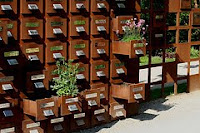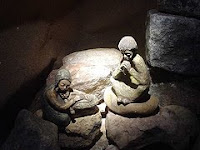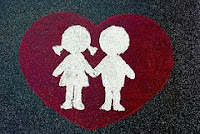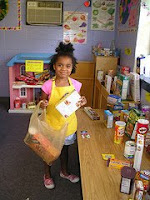Ah, yes, it's that glorious time of year when I think about the many, many books I want to read and the limited time I have to read, and, like a girl on a parent-imposed budget in a clothes store, pick and choose from the delectable offerings before me.
My book list for 2010, which you can see in the right hand column of this blog, is a little less ordered than
my 2009 list. I've topped it with the books I'm reading (or would like to be reading) at the moment:
A book on the cross:CJ Mahaney's Living the Cross-Centred Life
I haven't started this one yet, despite my good intentions! It's one of the books I
should be reading, or
would be reading if I wasn't feeling so exhausted and end-of-
yearish, as part of my ongoing goal to read a book on the cross every year. I was about to read this a couple of months ago and discovered I'd lost it; I just bought a new copy.
A book on biblical womanhood:Mark Chanski's Womanly Dominion: More Than a Gentle and Quiet Spirit
I have to admit that the title made me wonder. But this book was warmly recommended on
girltalk and by my friend
Sus, so this the next book on biblical womanhood I'm planning to read. There are many others I'd like to read, like Sharon James'
God's Design for Women (I've dipped into this and it's excellent!) and Carolyn
McCulley's Radical Womanhood.
Some Christian biography:Naomi Reed's My Seventh Monsoon
I wanted to read this book in 2009 but didn't quite manage it. I'd love to read it this summer! The wonderful exchange on
EQUIP book club between Naomi and Rachael whet my appetite. I enjoy Christian biography, and would like to read much more than I do.
A book on writing:Mark Tredenick's The Little Green Grammar Book
Yes, I am reading this, and enjoying it, if you can enjoy a book which uses words like
appositives and
complements and
prepositional phrases (and no, I don't know what they mean). I love books about writing, I love the way Mark makes grammar interesting, and I'd love to learn how to use a dash, semi-colon and comma correctly!
A Christian classic:GK Chesterton's Orthodoxy
As I said last year (and didn't!) I'd like to read a classic Christian book every year. I'm taking Chesterton away with us this summer. Later in the year, I may also attempt John Owen's
The Mortification of Sin and
Overcoming sin and temptation because they're so often recommended, and because they might help me prepare my seminar on change. And I'd like to read CS Lewis's
The Weight of Glory.
A novel (or six):Marilynne Robinson's Home
The summer holidays are swiftly approaching, and this is one of the novels on my holiday list! I've listed them all together so you can see what I'll be reading during the hols: more
Marilynne Robinson (I read
Gilead and adored it), Marcus
Zusak's The Book Thief, and Margaret Atwood's
Surfacing, just for starters!
Some teen fiction:Stephenie Meyer's Twilight
I'm only reading this so I can understand teen culture more deeply. I love teen fiction, especially teen fantasy (
Tamora Pierce, Emily
Rodda, J.K.Rowling). I read
Twilight a couple of weeks ago, and I'm about to launch into the rest of the series. A treat I'm saving for the summer holidays - long, lazy days reading on the couch (and taking the kids on outings, and
decluttering our home, and ...).
A book to read with my husband:John Piper's This Momentary Marriage
Steve and I would like to start reading a chapter from a book on marriage together each week. We're starting with John Piper. I love the way Piper shows us how marriage has cosmic significance far beyond itself! Another book on marriage I'd like to read (or rather, finish) is Christopher Ash's
Married for God.
A book on discipling my daughter:Vicki Courtney's 5 Conversations You Must Have With Your Daughter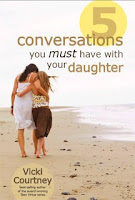
This is from my unofficial list of "Books I started reading before writing for
EQUIP books interrupted my reading plan". One of my projects for 2010 is to read lots of books about how to disciple your daughter (including Becky Freeman's
Mom's Everything Book for Girls). I plan to start a new
bloggy series called
Resources for discipling your daughter in early 2010.
A book to read with my daughter:Donna Miller's Growing Little Women for Younger Girls
My 11 year old daughter Lizzy and I started getting together weekly earlier this year to read the Bible and learn about godly womanhood. This is the first book we've sampled; we plan to sample more, like Carol Fiddler's
A Girl of Beauty, as my book list shows. We're going to give each book a mother-daughter score for my series
Resources for discipling your daughter - watch this space!
A book on women's sexuality:Linda Dillow's Intimate Issues: 21 Questions Women Ask About Sex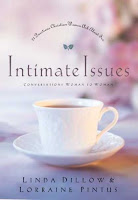
I foolishly volunteered to write an article about women and sexual purity (gulp!) next year. Hence the large number of books I want to read on this topic: Ed Wheat's
Love Life for Every Married Couple, Tony Payne and Philip Jensen's
Pure Sex, and Tim Chester's yet-to-be-published
Captured by a Better Vision: Living Porn-Free. A book on change and Christian growth:Jerry Bridges's The Discipline of Grace: God's Role and Our Role in the Pursuit of Holiness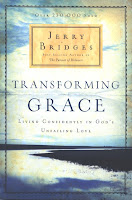
I loved the way Jerry Bridges'
The Discipline of Grace gave me a more grace-centred and biblical perspective on the topic of spiritual disciplines when I was reading and writing about it earlier this year. I'm hoping he'll do the same as I think about the topic of change for a women's retreat I'm leading late next year. I suspect John Piper's
Future Grace will be similarly helpful.
A book on biblical counselling and depression:Ed Welch's Depression: A Stubborn Darkness
I'm a third of the way through this book, and I'm enjoying its sympathetic, biblical, wise and readable approach to depression. Reading this is part of my ongoing quest to read everything Ed
Welch or any other biblical counsellor from
CCEF has ever written! Hence the large number of books by Ed
Welch and David
Powlison on my list.
A book about childcare:Steve Biddulph's Raising Babies: Why Your Love is Best
I started reading this a few months ago, but life got a little busy, so I've put it down for now. I'm reading this as part of my ongoing project to write about
childcare on this blog. I'm half way through, and the book is fantastic so far. If you're thinking about childcare, this is a must-read. Expect a review soon(
ish).
A book about teenagers:Josh Harris's I Kissed Dating Goodbye
Steve and I are thinking about the ground rules we want to give our children for dating in their teen years. We're leaning towards Josh Harris' approach (we think!) but I'd like to read more about it first. This is a discussion I'd like to open up on
in all honesty some time. Another book about teens which I can't wait to read is Paul David Tripp's
Age of Opportunity.
So there you have it. Pretty much all the books I want to read in 2010 are about these topics, except for a few random Christian books like Paul Grimmond's
Right Side Up and Colin Marshall's
The Trellis and the Vine. I hope you enjoy browsing
my list!
What are you planning to read in 2010? Have you got any other suggestions for me?
 I look back over the year, and all I see is failure.
I look back over the year, and all I see is failure. This has been a year of grace. A year not of perfection, but of progress. A year when God used suffering to push me into a new shape. A year when I came to see the love of Christ more clearly. A year when my self-control, my ability to say "no", grew just a tiny bit stronger. A year when I gained a little more courage to share my faith. A year not of completion, but of growth.
This has been a year of grace. A year not of perfection, but of progress. A year when God used suffering to push me into a new shape. A year when I came to see the love of Christ more clearly. A year when my self-control, my ability to say "no", grew just a tiny bit stronger. A year when I gained a little more courage to share my faith. A year not of completion, but of growth.

